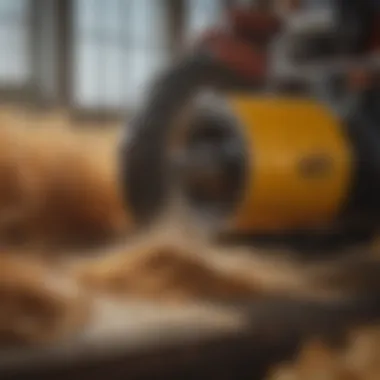Enhancing Agricultural Efficiency with Napa Oil Filter Cutters


Intro
In the realm of modern agriculture, the effective maintenance of machinery is paramount. As equipment becomes increasingly complex and essential for large-scale farming operations, the tools used to maintain this machinery gain significance. One such tool is the Napa oil filter cutter. It plays a vital role in streamlining the oil change process, a routine yet crucial aspect of tractor and machinery upkeep. This article examines the features of Napa oil filter cutters, discussing their relevance in the agricultural sector and how they contribute to sustainable practices and improved productivity.
Overview of the Topic
Definition and Importance
Napa oil filter cutters are specialized tools designed to help users efficiently cut open oil filters. This process allows users to inspect the filter's condition and analyze the oil that had been filtered. Understanding the condition of these components can prevent equipment failure and enhance machinery longevity. By prioritizing maintenance, farmers can ensure their equipment remains reliable in critical times, like harvest season.
Current Trends
Recently, there has been a growing emphasis on sustainability in agriculture. Farmers increasingly recognize the impact of well-maintained equipment on overall productivity and environmental outcomes. Napa oil filter cutters align with this trend by facilitating thorough inspections and preventive maintenance strategies. As the agricultural industry pushes towards technology integration, the adoption of tools like the Napa oil filter cutter is becoming more common. There is also a noticeable shift toward comprehensive maintenance protocols that include regular inspections and detailed analyses.
Key Techniques and Practices
Step-by-Step Guide
- Preparation: Ensure you have a clean workspace. Gather the necessary tools, including the Napa oil filter cutter, a container to catch any residual oil, and safety goggles.
- Removal of the Oil Filter: Carefully remove the oil filter from the machinery. Be cautious not to spill any oil, as this can create hazards and environmental issues.
- Cutting the Filter: Position the oil filter cutter around the filter. Secure it in place and rotate the cutter to create a clean cut. Ensure minimal effort is used to avoid damage to the components being inspected.
- Inspection: Open the filter and examine its interior. Look for metal shavings or debris, which could indicate engine wear or other mechanical issues.
- Documentation: Take notes on your findings. This documentation can aid in long-term maintenance planning.
Tools and Equipment Needed
- Napa oil filter cutter
- Safety goggles
- Container for oil drainage
- Gloves
- Cleaning cloths
Challenges and Solutions
Common Obstacles
Despite the benefits of using Napa oil filter cutters, some challenges remain. Farmers may find the initial learning curve steep. Additionally, some might face resistance in modifying their current maintenance routines. Inconsistent availability of parts and tools may also be a concern in certain regions.
Innovative Solutions
To tackle these challenges, ongoing education and training programs can be implemented for farmers. Workshops can showcase the benefits of proper maintenance practices and the role of oil filter inspection. Furthermore, local suppliers can offer rental services for tools, ensuring farmers have access without a substantial initial investment.
By systematically addressing these challenges, the agriculture sector can cultivate a culture of proactive maintenance, ultimately leading to enhanced productivity and sustainability.
Preface to Oil Filter Cutters
Oil filter cutters are essential tools that play a crucial role in the maintenance of agricultural machinery. Their significance lies not only in their ability to extend the life of equipment, but also in ensuring optimal performance. In agriculture, where machinery types vary greatly, the practicality of these cutters becomes even more apparent. Their potential to positively impact machinery maintenance practices is extensive, leading to better productivity and lower operational costs.
Definition and Purpose
An oil filter cutter is a device designed to cut open oil filters, allowing for inspection of the used filter media. This inspection is vital in determining the health of an engine and the overall performance of agricultural equipment. Understanding the wear and tear on machinery aids in timely maintenance, which can prevent costly repairs down the road.
The primary purpose of these tools is to provide farmers and maintenance personnel with insights into the internal composition of oil filters. By doing so, they help in assessing contamination levels, identifying potential issues, and making informed decisions regarding oil changes and machinery upkeep. Efficient maintenance of equipment is key in agriculture, where productivity directly correlates to profitability.
Overview of Napa Oil Filter Cutters
Napa, known for its reliable automotive parts, offers a range of oil filter cutters that are specifically tailored for agricultural use. Napa oil filter cutters are engineered with durability and efficiency in mind. They feature sharp blades designed to cut through various types of oil filters without damaging the contents.
These cutters provide an easy and effective means to assess filter conditions and, by extension, engine health. The design is user-friendly, allowing even less experienced individuals to utilize them efficiently. Furthermore, Napa's commitment to quality ensures that their products last, reducing the frequency of replacement and reinforcing their value proposition in agricultural maintenance.


Choosing Napa oil filter cutters signifies a step toward more systematic maintenance practices, fostering a culture of preventive measures within agricultural operations. Their use not only supports better machinery care but can also enhance the sustainability efforts within farming, drawing a direct line between effective maintenance and environmental responsibility.
"Effective maintenance practices, powered by reliable tools like Napa oil filter cutters, serve as the backbone of sustainable agriculture."
Understanding both the purpose of oil filter cutters and the specific advantages that Napa offers prepares agricultural professionals to enhance their maintenance routines significantly.
Understanding Oil Filters and Their Role in Machinery
Oil filters are essential components in agricultural machinery. They serve a critical role in ensuring that equipment runs smoothly and efficiently. Understanding their function is crucial for any farmer or agricultural professional. By maintaining clean oil, these filters help enhance machinery performance and longevity while reducing the risk of costly repairs.
Function of Oil Filters in Agricultural Equipment
Oil filters perform several functions that are vital for the proper operation of agricultural machinery. Firstly, they remove contaminants such as dirt, debris, and metal particles from the oil. Clean oil lubricates various engine parts, minimizing wear and tear. This function is particularly important in agriculture, where machines operate in varied and tough environments.
Oil filters not only protect engine components but also improve fuel efficiency. When the oil is clean, the engine does not have to work as hard, leading to less fuel consumption. This can result in significant cost savings, considering the scale of operations in agricultural settings.
In essence, oil filters are the frontline defense against premature engine failure. They ensure that agricultural equipment maintains optimal performance, which is essential for productivity and yield.
Importance of Regular Maintenance
Regular maintenance is a cornerstone of effective agricultural practices. For oil filters, this means consistent checks and timely replacements. The significance of this cannot be overstated. Keeping oil filters in good condition helps avoid breakdowns and prolongs equipment life.
Neglecting oil filter maintenance can lead to serious consequences. Over time, filters can become clogged with contaminants. A clogged oil filter restricts oil flow and can cause the engine to overheat, leading to catastrophic failure. Regular checks and replacements can mitigate these risks, saving both time and resources.
Farmers should set up a routine maintenance schedule that includes oil filter inspection and replacement based on the manufacturer's recommendations. Additionally, leveraging tools like Napa oil filter cutters can make this process more efficient. By easily cutting open filters, farmers can evaluate their condition and ensure that their machinery is running at peak performance.
"Regular maintenance of oil filters is paramount for safeguarding the efficiency and durability of agricultural machinery."
Mechanics of the Napa Oil Filter Cutter
The functioning mechanics of Napa oil filter cutters play a vital role in the effectiveness of maintenance practices for agricultural machinery. Understanding these mechanics not only enhances the user's experience but also enables agricultural professionals to appreciate the tool's benefits fully. Critical consideration of the design and operational processes lays a foundation for efficient implementation.
Design Features of Napa Oil Filter Cutters
Napa oil filter cutters are engineered with several design features that contribute to their efficacy. These features include:
- Robust Construction: The materials used in Napa oil filter cutters are durable, allowing for consistent performance under tough conditions. This is crucial in agricultural settings where equipment is often exposed to varied elements.
- Precision Cutting Blade: The cutter is equipped with a sharp blade designed for precision. This ensures that filters are cut cleanly, reducing the risk of metal shavings contaminating the oil.
- Ergonomic Handle: Users can benefit from an ergonomic design that minimizes strain during operation. Comfort during use enhances productivity and encourages consistent maintenance practices.
- Adjustable Settings: Many Napa oil filter cutters feature adjustable settings that accommodate different filter sizes. This versatility is essential in agriculture, where machines may vary in specifications.
These design elements collectively foster a tool that supports efficient maintenance while promoting safety. Recognizing these features allows users to make informed decisions when utilizing Napa products, ensuring optimal results in their maintenance practices.
Operational Process Explained
The operational process of using Napa oil filter cutters is simple yet impactful. Initially, the user positions the oil filter securely on a flat surface, taking care to ensure that it is stable. Following this, the cutter is aligned with the filter's top, directly centering the blade.
Once in position, users press down firmly on the handle. The design's leverage mechanism allows the blade to puncture the filter effortlessly, resulting in a complete cut around its circumference. Users can then lift the filter, showcasing the cut, which facilitates easy removal of any remnants remaining.
"Efficient cutting and removal of oil filters not only conserves time but also enhances the quality of oil filtration, leading to longer machinery life."
Regular practice of these steps aids in maintaining the machinery's operational efficiency. The streamlined process is also a significant reason why agricultural professionals opt for Napa products. Furthermore, as users become accustomed to the operation, they are likely to adopt a routine that ultimately enhances overall equipment maintenance strategies.
Understanding the mechanics behind Napa oil filter cutters not only showcases the importance of the tool but also emphasizes its application in a broader context of agricultural maintenance.


Benefits of Using Napa Oil Filter Cutters
Napa oil filter cutters serve as a pivotal tool in the realm of agricultural maintenance, offering several advantages that appeal directly to machinery operators and farmers. Understanding the depth of benefits these cutters provide is crucial for both efficiency and sustainability. Here, we delve into the specific elements that underpin the importance of using Napa oil filter cutters in agriculture, focusing on cost efficiency, extending equipment lifespan, and enhancing operational efficiency.
Cost Efficiency in Maintenance
One central advantage of Napa oil filter cutters is their contribution to cost efficiency. In any agricultural operation, maintenance budgets can quickly escalate. Napa cutters help mitigate these costs by enabling farmers and technicians to perform more thorough inspections of used oil filters. When filters are cut open, it becomes possible to examine the debris and contaminants they capture. This inspection can reveal underlying issues within machinery, allowing for timely interventions before they result in costly repairs.
By catching potential problems early, operators save on hefty repair bills and downtime. Moreover, by incorporating Napa oil filter cutters into regular maintenance routines, farmers can optimize the lifespan of their equipment, ultimately reducing the frequency of parts replacements. This approach not only keeps machinery running smoothly but also contributes to overall budget management—a primary concern for any agricultural operation.
Extending Equipment Lifespan
Another significant benefit of using Napa oil filter cutters is their role in extending the lifespan of agricultural equipment. Regular inspection of oil filters through cutting can provide invaluable insights into the operating condition of various machine components. When filters are regularly analyzed, it can indicate if a machine is facing excessive wear or if there is contamination from external sources.
Prolonged equipment life often translates to higher productivity and efficiency. Operators can extend operational periods between major overhauls or replacements when small issues are addressed promptly. This proactive maintenance strategy—fueled by the use of Napa oil filter cutters—reflects a commitment not just to saving money but also to maintaining the integrity of fully operational equipment.
Enhancing Operational Efficiency
Finally, Napa oil filter cutters significantly enhance operational efficiency. In the fast-paced environment of agriculture, downtime can be detrimental. By utilizing the capabilities of Napa cutters, maintenance staff can swiftly ascertain the condition of oil filters, allowing for faster decision-making concerning maintenance needs. This process minimizes the interruption to daily operations, ensuring machinery remains available for essential tasks.
In addition, well-maintained machinery operates more efficiently. Clean oil filters mean cleaner oil circulating through the engine, which translates to better performance. This results in lower fuel consumption and reduced emissions, aligning with sustainable practices that many agricultural businesses strive to implement. The overall effect is a continuous improvement cycle where efficient practices lead to better productivity and environmental responsibility.
"Utilizing Napa oil filter cutters can significantly impact maintenance culture, leading to better machinery care and sustainability in agriculture."
Practical Applications in Agriculture
The practical applications of Napa oil filter cutters within agriculture are vast and crucial. These tools serve not only to maintain machinery but also to enhance overall operational efficacy. Understanding their application in routine maintenance and environmental measures contributes significantly to their value in the agricultural space.
Routine Maintenance Practices
Routine maintenance is essential for ensuring that agricultural equipment operates smoothly and efficiently. Napa oil filter cutters play a pivotal role in this type of maintenance by allowing for the effective examination and disposal of oil filters.
Using a Napa oil filter cutter enables farmers to easily remove filters from their machinery. This process helps identify any contaminants or issues that may arise in the filter – information that is critical in preventing equipment failure. Regularly cutting and inspecting filters leads to early detection of potential problems in the oil system, ultimately saving time and costs associated with larger repairs.
Additionally, the act of cutting filters offers insights into the wear and tear levels of machinery components. By assessing the condition of oil filters, farmers can make informed decisions regarding the necessary maintenance or upgrades required. This proactive approach translates to improved productivity and less breakdown during crucial planting and harvesting seasons.
Key aspects of routine maintenance using Napa oil filter cutters include:
- Regular inspection of used filters to determine signs of wear.
- Scheduled servicing to ensure that oil filters are changed in a timely fashion.
- Record-keeping of filter conditions and related maintenance actions for future reference.
Environmental Considerations
Environmental consideration is becoming increasingly vital for agricultural practices. The use of Napa oil filter cutters can support farmers in adopting more sustainable practices. With proper disposal practices, the risk of oil leaks and contamination of soil or water can be significantly reduced.
By cutting open oil filters before disposal, farmers can ensure that they manage any remaining oil or contaminants responsibly. This method allows for better segregation of oil and filter material, increasing the likelihood that they can be recycled or disposed of in an environmentally friendly manner.
Additionally, implementing these cutters can decrease the overall waste produced on a farm. Instead of discarding full filters, a farmer can check the integrity of the filter and determine if it can be cleaned and reused. This not only reduces waste but also promotes a culture of sustainability within agricultural practices.
In summary, Napa oil filter cutters have practical applications that enhance both the operational and environmental aspects of agricultural maintenance. They empower farmers to conduct thorough routine checks and promote responsible disposal practices, contributing to the sustainability of agricultural operations.
"By integrating Napa oil filter cutters into their maintenance routines, farmers can achieve higher efficiency and contribute positively to the environment."


Comparative Analysis with Other Brands
In today’s agriculture-focused market, the choice of tools, including oil filter cutters, has a significant impact on maintenance practices. An effective comparative analysis of Napa oil filter cutters against other brands reveals not just specifications but also practical experiences. Understanding these differences is vital for farmers and equipment maintenance professionals because it helps them make informed decisions. Factors such as reliability, efficiency, and user experience can greatly influence productivity in agricultural settings.
Key Differences with Competitor Products
When analyzing Napa oil filter cutters in contrast to competitor products, certain distinct features emerge.
- Quality of Construction: Napa cutters are known for their robust design, utilizing high-grade materials that ensure durability and prolonged usage. Many competing brands may compromise on material quality, leading to quicker wear and tear.
- Cutting Mechanism: Napa’s design often integrates advanced cutting mechanisms that allow for precision and efficiency. This contrasts with some competitors that may offer basic cutting options, making the Napa cutter more desirable for detailed work.
- Ergonomics: Napa tools typically prioritize user comfort, with well-designed handles that minimize strain during usage. This aspect may not be present in all competitor models, which can affect user efficiency and satisfaction.
- Adaptability: The Napa cutter is made to accommodate various types of filters, enhancing versatility. Some brands might limit their cutter's compatibility to specific products, reducing their overall utility in diverse agricultural applications.
User Feedback and Industry Opinions
User feedback serves as a powerful barometer for evaluating performance and satisfaction levels with any product. In many instances, Napa oil filter cutters receive positive remarks for several reasons.
"The Napa cutter's quality is evident. I’ve used others before, but this one lasts longer and cuts cleaner."
This sentiment echoes among various online forums and agricultural communities, where users often share their experiences.
- Maintenance Efficiency: Many users emphasize that Napa cutters simplify the maintenance process. Less frequent need for replacements due to the durability of Napa products stands out in user reviews.
- Customer Support: Feedback also suggests that Napa provides support that outshines several competitors, which is an essential factor when farmers seek assistance during critical maintenance tasks.
- Recommendation Rates: Surveys have shown higher recommendation rates among farmers who have switched to Napa from other brands. They often mention that the cutter's performance justifies the cost despite alternative options being available at lower prices.
Understanding these factors will allow agriculture professionals to assess the right tools for their maintenance needs, thereby improving overall effectiveness while lessening downtime from equipment failures.
Best Practices for Utilizing Oil Filter Cutters
Using Napa oil filter cutters effectively can significantly improve maintenance workflows in agriculture. Understanding the best practices surrounding their use will enhance both efficiency and safety. This section covers essential elements that should be considered for optimal use of oil filter cutters.
Safety Precautions
Safety is paramount when utilizing oil filter cutters. Here are several key precautions:
- Wear Protective Gear: Always use safety goggles and gloves to protect against sharp edges and oil spills.
- Proper Training: Ensure that all operators are trained in how to use the cutters correctly. Familiarity with the device can prevent accidents.
- Work in Well-Ventilated Areas: Perform cutting tasks outdoors or in spaces with good airflow. This minimizes exposure to fumes from oil.
- Secure the Filter: Make sure that the oil filter you are cutting is secured properly in a vice or clamp. This prevents slipping and ensures cleaner cuts.
- Avoid Loose Clothing: Wear fitted clothing to avoid catching on parts of the cutter or the filter itself.
By adhering to these safety precautions, users can minimize the risk of injuries during the maintenance process.
Maintenance Tips for Longevity
To ensure Napa oil filter cutters remain in peak condition, proper maintenance is essential. Here are practical tips to enhance their longevity:
- Regular Cleaning: After each use, wipe down the cutter to remove oil and debris. This prevents rust and keeps the blade sharp.
- Inspect for Damage: Regularly check the cutter for any signs of wear or damage. Replace any worn parts timely to maintain cutting efficiency.
- Lubrication: Apply a light oil to moving parts to keep them functioning smoothly. This reduces friction and prolongs the life of the cutter.
- Store Properly: When not in use, store the cutter in a dry place with the blade covered. This protects it from moisture and accidental damage.
- Avoid Overuse: Use the cutter only for its designated purpose. Overuse can lead to premature wear.
Implementing these maintenance tips contributes to effective use of Napa oil filter cutters and prolongs their life span, providing more value for investment.
Remember: Regular attention to safety and maintenance not only keeps equipment in good shape but also enhances overall productivity in agricultural practices.
By following the best practices outlined in this section, farmers and agricultural professionals can ensure that they utilize Napa oil filter cutters to their fullest potential, promoting safer, more efficient maintenance strategies.
Culmination: The Future of Maintenance Tools in Agriculture
The evolution of maintenance tools such as Napa oil filter cutters is critical to the agricultural sector. As machinery becomes more advanced, the need for efficient maintenance solutions grows. Napa oil filter cutters exemplify this evolution, providing significant benefits in terms of equipment longevity and operational efficiency.
Emerging Trends in Machinery Maintenance
In recent years, embrace of technology has revolutionized how agriculture is managed. Precision agriculture and remote monitoring systems require robust maintenance tools. The integration of data analytics into machinery maintenance is on the rise. This allows for real-time assessment of equipment performance. As a result, farmers can schedule maintenance before failures occur. Napa oil filter cutters fit into this trend, as they simplify the inspection process. Farmers are equipped to analyze the condition of filters rapidly, reducing downtime.
"The future of agriculture lies in efficient management of resources and technology deployment."
Furthermore, there is a shift towards sustainability. Products that reduce waste and improve efficiency are becoming more integral. Using Napa oil filter cutters aligns with this trend. They help ensure that oil filters are correctly processed, contributing to reduced environmental impact. This focus on eco-friendly practices enhances the reputation of agricultural operations while maintaining compliance with regulations.
The Role of Innovation in Agriculture
Innovation plays a central role in the agricultural industry's future. Advanced tools and techniques are crucial for meeting the challenges of modern farming. Napa oil filter cutters represent innovation in maintenance practices. They allow agricultural professionals to perform precise cuts and easily inspect oil filters. This precision ensures that fewer errors occur during maintenance.
In addition to improved efficiency, innovation enhances user safety. Tools designed for ease of use minimize the risk of injuries. Employees can complete tasks with confidence, knowing that they are using reliable equipment. Napa's commitment to innovation ensures their cutters meet industry standards and address the evolving needs of farmers.



